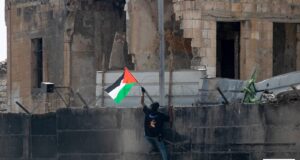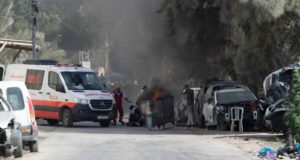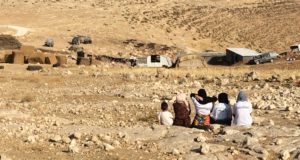David Bromwich | The Huffington Post
16 March 2010
To wipe the spit off his face, Biden had to say it was only rain.” The Israeli journalist Akiva Eldar was tapping a vein of bitter Jewish wit when he wrote those words about the humiliation of the vice president on his recent state-visit to Israel. Trust a weakling, the saying goes: if you spit in his face he’ll just pretend it was rain. Last week, an American leader finally chose not to pretend.
Before Biden issued his rebuke to a prime minister who forgot the second rule of diplomacy — when you undermine a friend, have the decency to wait till he waves goodbye — he had offered the traditional performance of an American dignitary in Israel. Thus in response to the unctuous platitudes of Shimon Peres, Biden had actually said:
“It’s good to be home.” A crazy thing for an American to say outside America. But in the context of our relations to Israel over the past thirty years, such a remark is almost par-for-the course. It shows how reckless American mainstream opinion had grown in its indulgence of all things relating to Israel. It had reached the point where a reflex avowal of false nostalgia was taken as the simplicity of good manners. An American politician in Israel is routinely expected to show more piety for Tel Aviv than for Plymouth Rock.
The sentiment of “home” dished up by the vice president and the graceless insult with which it was met by the Israeli prime minister also reflect a political background. The United States had recently assisted Israel in its attempt to suppress the facts and discredit the findings of the Goldstone Report. The effort had several steps, all of them brutal. First there was the character assassination of Judge Goldstone. A South African Jew, a renowned authority on international law, who had presided over the trial of Slobodan Milosevic and whose probity had never been called into question in Israel, Goldstone was reviled in terms of abuse that would normally be leveled against a gutter anti-Semite. A hater of Israel, they called him; though his daughter is an Israeli and he has enjoyed good relations with Israel in the past. All of this was disturbing enough in itself. It is more disturbing in the light of that Jewish ethical tradition in which no station of life is higher and no character more venerable than that of the honest judge. Not one major finding, not one witness, not one report of an incident in the Goldstone report, has yet been successfully challenged to vindicate the crash of ad lib slanders.
A second strategy adopted by the Netanyahu government and by the Obama administration was to claim that Goldstone’s partiality was proved by his failure to condemn Hamas. This charge is all over the anti-Goldstone literature. Yet the report in fact condemns Hamas as well as Israel. What next? The Israeli government and army said that all those acts of wanton destruction enumerated in the report were not actually done on purpose. The bombing or shelling of the chicken farms, the flour mill, the hospitals, the mosques, the UN compound, the water treatment plants–how could they know what they were doing? Or else, they had good intelligence there were terrorists hiding there, but sometimes even good intelligence is faulty. And the use of white phosphorus? Israel is still investigating. A last resort of evasion was to give up defending the actions of the onslaught, and, instead, change the terminology. Claim, now, that the horror of Gaza was one of the ironies of “asymmetrical warfare.”
Asymmetrical it certainly was. 1385 Palestinians dead, 762 of them civilians. 13 Israelis, ten of them soldiers, four by “friendly fire.” The Israeli authorities would like America and the world to think these numbers a natural by-product of asymmetrical warfare. In Boston, on March 5, 1770, a crowd of Americans threw rocks at British soldiers and were answered by disorderly gunfire. Five Americans were killed, and we call it the Boston Massacre. What was Gaza? Look again at the numbers.
Barack Obama abetted the Israeli drive to bury the Goldstone report by allowing his government to say it was “one-sided and deeply flawed” and also the subject of “grave concerns.” Obama had already shown his loyalty by his silence regarding the actions of Israel in Gaza in January 2009. It all stopped, by apparent arrangement, just before inauguration day. Given that history, what reason had Netanyahu to suppose that Obama would discover the end of his patience last week? There seemed no jerk of the leash to which this American president, like so many others, would not respond obediently. Besides, as Obama knows and as Netanyahu knows he knows, American Jewish liberals who are loyal to Israel are the stamina of the Democratic Party.
After an initial perfunctory apology and an incredible profession of innocence, Benjamin Netanyahu has reverted to the customary usage of Israeli-American public relations. He has deplored the unhappy timing of the announcement of the 1600 new Israeli settlement units, but meanwhile has affirmed the substance of the order. And he has indicated his intention to resist any further American attempt to restrain Israel. Netanyahu has two considerations in play. One is to insert himself into American politics (not for the first time) to weaken a president he never liked who shows serious signs of waning popularity. Another is to buy time for the resumption of his policies by protracting a mimic war of “wounded feelings” between the U.S. and Israel. This can serve to draw attention away from the Israeli subjugation of the Palestinians. There has been a danger, after all, over several months, that Palestinian protesters, aided by Israelis who sympathize with their cause, would crystallize into a movement essentially non-violent in orientation and catch the conscience of America and the world. The fear of Netanyahu and the Israeli right is that the Palestinian cause will indeed become a non-violent mass movement.
Israel has taken strong measures against that possibility, especially in the last few months, by rounding up and imprisoning non-violent protesters. Most recently, according to a report by Amira Hass on March 15 in Haaretz, Iyad Burnat was arrested for sending an e-mail that said “the third intifada is knocking at the door.” The consequence? The towns of Bil’in and Na’alin, centers for non-violent protest, are closed until August 17.
In general the Netanyahu government regards the prospect of a third intifada with fatalistic acceptance. “Arabs are like that.” However, concerning the form the intifada will take Netanyahu is not indifferent. The next uprising will be easier to manage in public and easier to crush if it is violent. At the annual AIPAC convention next week–a rite of passage for American statesmen at which the burden of both flattery and mendacity is understood to rest on American shoulders–Netanyahu will serve the usual fare and trust nobody in the crowd of domestic speakers to show King Olaf’s powers of resistance.
But at this juncture all Americans, even the domestic performers at AIPAC, have an advantage if they dare to take it. It lies in the power of truths long-unspoken that, because of Israel’s recent actions, are starting to be spoken. Racism as much as fear drives the Israeli policy toward Palestinians. This has always been known. But who now will deny that there is also, in the Israeli distrust and visceral ridicule of Barack Obama, an undercurrent of racism? This has only lately been uttered in the American mass media.
On Hardball on March 9, Chris Matthews in Jerusalem interviewed Ethan Bronner, the New York Times bureau chief. They began by talking about Israeli resistance to the content of Obama’s Cairo speech, and eased into a polite exchange about the prejudice against Obama’s middle name, when all at once a veil dropped away:
BRONNER: I think there’s also some sense here that–some degree of racism, to be perfectly honest.
MATTHEWS: Yes. They–because they see it as a black man.
The operation of Israeli racism against a black American president is powerfully enforced by the settler movement and by its American allies, the Christian Zionists. Indeed, just before the Biden visit, the Israeli primer minister was host (and a far more caring host) to the apocalyptic Judeo-Christian supremacist John Hagee.
Settler racism and Christian Zionist racism (associated with the “birther movement” in the U.S.) converge in a belief in the political and the social superiority of Israeli Jews over Palestinians — a superiority that for the Christian Zionists corresponds (in ways that need no comment) to the natural superiority of American whites to blacks. It was salutary to see Matthews and Bronner calling racism by its name. The effects of cracks in the official silence have still to be tallied, but truth may catch as well as falsehood.
Will Americans now stop calling the annexation wall — which cuts off West-Bank Israeli colonists from their Palestinian inferiors — “the security fence”? It is a wall. Its function is only partly to secure. It is there also to separate, to mark off, and to overawe. It registers a difference of kind and a difference of caste. But there is no familiar name for the separation of Israelis from Palestinians. The separation produces, and it aims to support, a condition of constant inequality. It seems too weak to call the result “segregation.” Ehud Barak, a solid authority one would have thought, has recently called it apartheid, and language that is accurate in the eyes of the defense minister of Israel should be good enough for Americans. Many witnesses who know both countries will tell you conditions are worse today in the West Bank and Gaza than apartheid was in South Africa. But that analogy surely will not be discussed, not even to be violently rebutted, at the AIPAC convention next week.
A distraction besides the pouring of unguents on a “family feud” will preempt much talk about Palestine. Instead, a great deal will be said about Iran. The Holocaust will be evoked in this context. But here again an answer is timely for Americans who dare to inform themselves. Ehud Barak on March 8 told the Foreign Affairs and Defense Committee of the Knesset that Iran poses no existential threat to Israel. The truth is that whatever the wild men say, no country of that region threatens any other with extinction; but one country is widely believed to be well equipped for nuclear war, and that country is Israel.
The existential threat in the vicinity of Israel is not extermination but expulsion. And Israel is the agent rather than victim of that threat. The project is being carried forward by legalized acts of dispossession, by harassment, by deprivation of useful work, and by the deliberate infliction of misery. The most notable Israeli spokesman for Palestinian expulsion happens not to be a security billionaire or a radio demagogue but the foreign minister of Israel, Avigdor Lieberman. When Avigdor Lieberman was welcomed last February to the world of nations by Senator Joe Lieberman, the world took note.
There have been some voices in the past decade to remind us that the United States is endangered by the aggressive expansionist policies of Israel. Amy Goodman, Philip Weiss, M.J. Rosenberg, Glenn Greenwald, Tony Karon, Daniel Luban — but it is an ungrateful subject and not many have had the nerve or the pockets to look at it steadily. And yet, if one takes stock of more recent stories and columns, one has to add to the list Bill Moyers, Joe Klein, Chris Matthews. It seems possible that a nationwide self-censorship which has lasted more than forty years, on a subject of enormous importance — a “friendly silence” that is contrary to the spirit of democracy itself — is at last beginning to lift.
And those, from the vice president down, who have now begun to speak openly, have a new ally in General David Petraeus. For what Biden said behind closed doors to Netanyahu—that your actions are “dangerous for us”–did not come from Biden alone or from himself and the president but also from General Petraeus. A recent story in Stars and Stripes reported that Petraeus has been impressed by clear evidence that American troops are at risk from America’s supply of weapons and approval to a policy that grinds down the Palestinians. Israel’s continuous fertilizing of the soil in which anti-American terror is grown had driven Petraeus to ask at a January meeting of the joint chiefs of staff that Palestine be placed under the regional control of CENTCOM. The request was turned down, but the analysis that supports the request is in the public domain. It has been an open secret for a long time, and what Petraeus said to the service heads a few weeks ago, he has repeated in Congressional testimony today.
So the door to an honest discussion of Israel and Palestine has been opened wide. Too wide for AIPAC, and all its journalistic outlets, to close with their usual dispatch. We are in possession now of the realistic knowledge that Israel’s policies endanger American troops and American interests; that by creating new terrorists, those policies also threaten the security of the United States. These truths are not less evident today than they were in 2001. But a disturbing fact, no matter how unsettling, does not make a decisive argument in itself. All one can hope is that, in thoughtful people, it will create a pause for thought. It is one thing to sacrifice yourself for a friend in the cause of justice; another to sacrifice yourself for a friend in the cause of injustice. With “the third intifada knocking at the door,” the old American pattern — an ever-renewable forgetfulness about the conduct of Israel and de facto postponement of the question of Palestine — is less tenable than ever. At the same time the overcoming of segregation in the United States bears close comparison with the hardening of segregation in Israel. The oppressions of Hebron in 2010 exceed those of Montgomery in 1965. And the settlers of Hebron, unlike the white citizens’ councils of Montgomery, know they have a national government they can rely on to support the next assertion of their supremacy.
Seven years ago today, an American civil rights worker, Rachel Corrie, was killed in Gaza, run over by a Caterpillar tractor driven by a soldier of the Israel Defense Forces. A civil suit against the Israeli defense ministry, by the parents of Rachel Corrie, was starting in a courtroom in Haifa during the recent visit of Vice President Biden. The event was barely noticed in the American press — it got more attention in Israel — but an AP video caught the statements made by Craig and Cindy Corrie on entering the court, statements remarkable for their dignity and candor.
Rachel Corrie wrote in an early letter from Gaza, addressed to “friends and family, and others” on February 7, 2003:
I have been in Palestine for two weeks and one hour now, and I still have very few words to describe what I see. . . . I don’t know if many of the children here have ever existed without tank-shell holes in their walls and the towers of an occupying army surveying them constantly from the near horizons. I think, although I’m not entirely sure, that even the smallest of these children understand that life is not like this everywhere.
She wrote in her last letter, to her father, on March 12:
I really don’t want to move back to Olympia, but do need to go back there to clean my stuff out of the garage and talk about my experiences here. On the other hand, now that I’ve crossed the ocean I’m feeling a strong desire to try to stay across the ocean for some time. . . .I would like to leave Rafah with a viable plan to return, too. One of the core members of our group has to leave tomorrow–and watching her say goodbye to people is making me realize how difficult it will be. People here can’t leave, so that complicates things. They also are pretty matter-of-fact about the fact that they don’t know if they will be alive when we come back here.
She would have returned if she could. And the cause that prompted her courage is a matter that the rest of us have barely begun to arrive at.
 International Solidarity Movement Nonviolence. Justice. Freedom.
International Solidarity Movement Nonviolence. Justice. Freedom.


